 Petzlover
Petzlover Both Somali and York Chocolate Cat are originated from United States. Both Somali and York Chocolate Cat are having almost same weight. Both Somali and York Chocolate Cat has same life span. Both Somali and York Chocolate Cat has same litter size. Both Somali and York Chocolate Cat requires Moderate Maintenance.
Both Somali and York Chocolate Cat are originated from United States. Both Somali and York Chocolate Cat are having almost same weight. Both Somali and York Chocolate Cat has same life span. Both Somali and York Chocolate Cat has same litter size. Both Somali and York Chocolate Cat requires Moderate Maintenance.
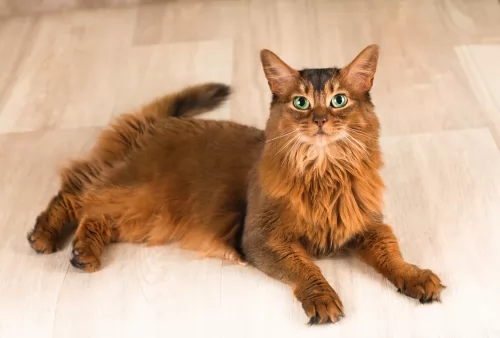 The Somali is a medium- to longhaired Abyssinian. It was in Britain that the original introduction of the longhaired gene took place.
The Somali is a medium- to longhaired Abyssinian. It was in Britain that the original introduction of the longhaired gene took place.
The first Somali cats came about in 1940 and it was British breeder Janet Robertson who exported some of her Abyssinian kittens to New Zealand, Australia and North America, Australia. Most of the kittens had long hair and breeders started showing an interest.
An American Abyssinian breeder Evelyn Mague decided to call her cats Somalis and the breed was recognized internationally by 1991.
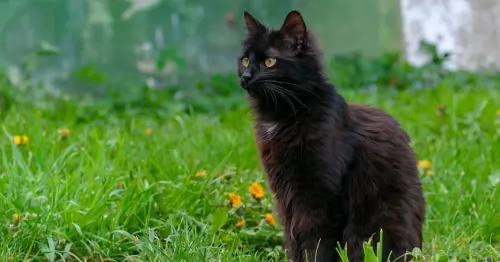 The York Chocolate cat is often referred to simply as the York. The cat was developed in New York in 1983 by breeder Janet Chiefari. The American breed of cat came about by selecting certain colors for breeding.
The York Chocolate cat is often referred to simply as the York. The cat was developed in New York in 1983 by breeder Janet Chiefari. The American breed of cat came about by selecting certain colors for breeding.
The breed isn’t recognized by cat registries, however, in March 1990, the Cat Fanciers’ Federation of the New England area recognized York Chocolates as an experimental cat breed.
By 2016 no registry carried its breed standard and it looks as though the cat is now extinct. Later is was also established that the International York Chocolate Federation was founded in 2003 but that the site seems to be archived.
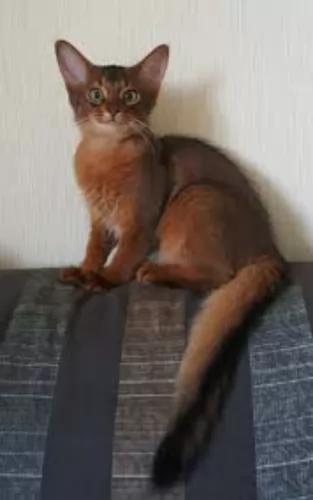 The beautiful Somali is a medium-sized cat which means he weighs in the region of 3 to 6kg. He is muscular and lean with the ears being set wide apart.
The beautiful Somali is a medium-sized cat which means he weighs in the region of 3 to 6kg. He is muscular and lean with the ears being set wide apart.
The ears are also tufted. The eyes of the Somali are almond-shaped and are usually a brown shade or green in color. The legs are long and the paws are also somewhat tufted. The tail is well plumed.
The Somali's coat is lovely and soft, while being thick and lustrous. The adult cats have a ruff. The Somali's coat comes in a range of colors but the most regular color is a beautiful brownish color with black ticking.
The Somali is an intelligent cat that relies heavily on its human owners for company as well as love and care.
They’re fun-loving cats that get on well with children in the home and from other pets. They are active cats and will need exercise. They should have some high perches and cat trees available so they can jump and climb.
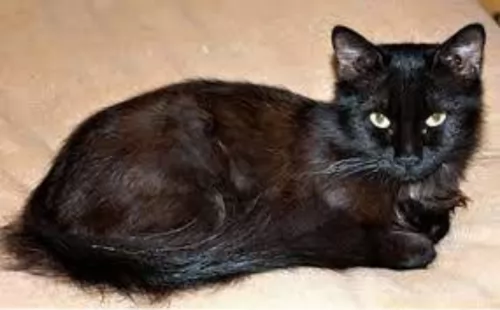 Today the breed is still under development and in the experimental stages. It is a medium to large cat, both robust, sturdy, and muscular.
Today the breed is still under development and in the experimental stages. It is a medium to large cat, both robust, sturdy, and muscular.
He can weigh up to 7 or 8 kg. The head is medium-sized with a rounded muzzle and the ears fairly large, pointed and tufted and broad at the base.
The eyes are medium in size, almond-shaped, and slanted slightly. The color of the eyes is a striking gold, green, or hazel.
The legs are also medium to long in length and well-muscled with the hind legs being a bit longer than the forelegs. The coat is medium to long, smooth and glossy with no undercoat. Color of the coat is mainly a rich chocolate color or silver, black and white.
The York Chocolate is a loyal and friendly cat. He is independent and although he loves his human family, he is perfectly happy on his own as well. They make wonderful pets as they get on well with children and also with other pets in the home.
They’re even-tempered and adapt well to all kinds of lifestyles. What is notable about this cat is that even if you tend to ignore him, he wants to lavish you with his attention. He is a cat that just loves to spend time with his human family.
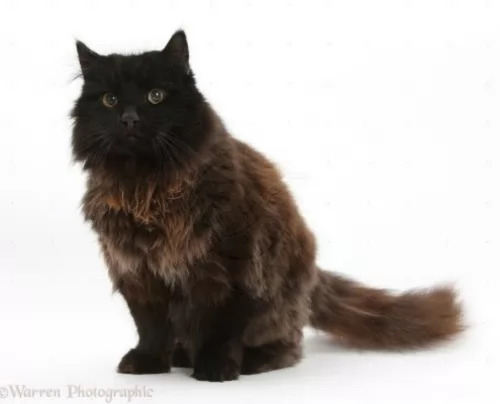 The York Chocolate is an ideal breed for families but he will get along well with single people too who are willing to make a fuss of him.
The York Chocolate is an ideal breed for families but he will get along well with single people too who are willing to make a fuss of him.
He is the kind of cat that makes himself at home indoors or outdoors. He has such an amicable nature and wants to be your friend. In return for this friendship, he needs to be given a whole lot of love and attention.
 Although the Somali cat breed is healthy, as with many other cat breeds, there are a few hereditary diseases found in the Abyssinian that may be linked to this breed too. Look out for eye problems with the cat as well as anaemia.
Although the Somali cat breed is healthy, as with many other cat breeds, there are a few hereditary diseases found in the Abyssinian that may be linked to this breed too. Look out for eye problems with the cat as well as anaemia.
Progressive retinal atrophy (PRA) is a degenerative disorder of the retina. This eye disease can either be inherited or acquired.
When a cat gets sick there are some antibiotics that have been associated with progressive retinal atrophy in cats. Cats can also develop vision loss if their diet is deficient.
You have to be very aware of your cat’s diet and ensure that he is getting all the right ingredients, one of which is amino acid taurine. If you can see that your cat is battling to see, you should get him immediately to the vet.even though there is no treatment for PRA. . The vet will explain to you how to make life more comfortable for your pet.
Anemia isn’t a specific disease with your cat but rather the result of some other disease or condition. The most common sign that your cat has anemia is that you won’t find that normal pink color of the gums. Your cat will be listless and there may also be signs of blood loss such as blood in the feces or urine. Your vet will do several tests to diagnose the anemia.
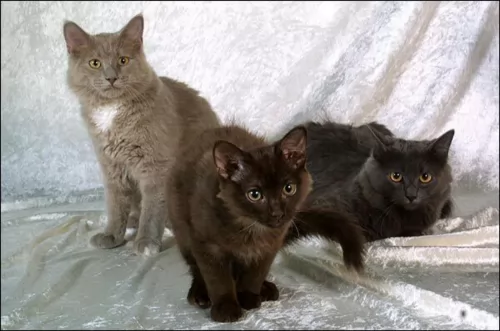 York Chocolates are generally considered to be healthy cats, but always schedule regular wellness visits with the vet if you suspect even the smallest illness.
York Chocolates are generally considered to be healthy cats, but always schedule regular wellness visits with the vet if you suspect even the smallest illness.
The insides of the cat’s ears should be examined regularly for signs of dirt and wax build-up that can lead to an infection.
The trend these days is to brush your cat’s teeth. This can absolutely traumatize your cat. When you take your cat for a check-up he will in any case look inside your cat’s mouth to make sure there aren't any bad teeth.
As a cat owner, it is a good idea to recognize the signs and symptoms of common illnesses in your cat. Cancer
Cats can get different kinds of cancer – where cells grow uncontrollably and spread to all parts of the body.
When a cat doesn't produce insulin, his blood sugar levels elevate and this can result in hyperglycemia.
Rabies is a viral disease that affects the brain and spinal cord. It's a deadly disease that can be prevented by vaccination.
Vomiting is a common problem with cats with many different causes. The danger with vomiting is that it can lead to dehydration,
A cat’s upper respiratory tract is susceptible to infections caused by a variety of viruses and bacteria.
 Cats can sometimes be finicky eaters and even the most delectable morsels might be ignored.
Cats can sometimes be finicky eaters and even the most delectable morsels might be ignored.
Every cat is unique but every cat is a carnivore – a meat eater – and requires a host of nutrients in their food to be healthy. Commercial cat foods aren’t all one and the same. You get different food for kittens, different foods for young adults, for pregnant cats, for energetic cats, and so on.
There is cat food for every season of a cat’s life. Other important considerations are feeding the right quantity of food to your cat.
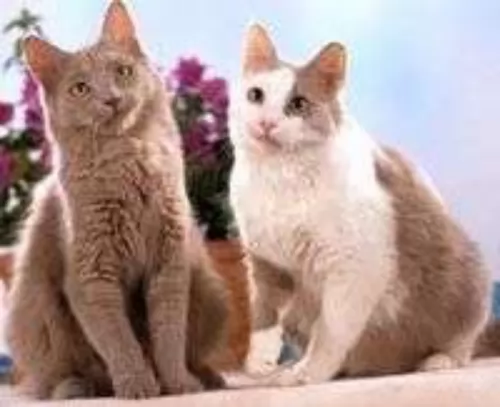 The coat of the York Chocolate is fairly short and it doesn't shed heavily. A weekly brush will suffice to help remove dirt and loose hairs as well as to maintain the coat’s sheen.
The coat of the York Chocolate is fairly short and it doesn't shed heavily. A weekly brush will suffice to help remove dirt and loose hairs as well as to maintain the coat’s sheen.
A high-quality diet high in protein and animal meat must be provided for your cat Cats are carnivores and are not plant eaters.